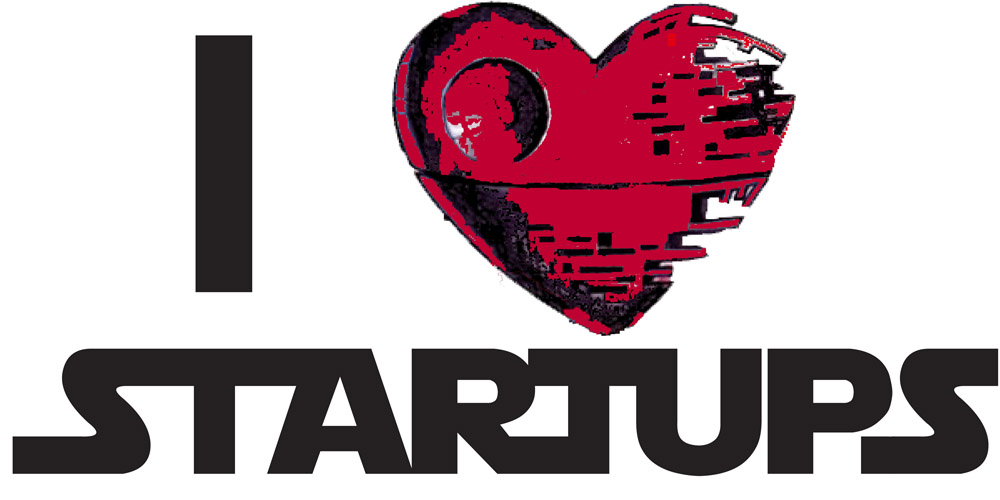Since starting what was then "GetLusty for Couples" last August (now
Passionly), let's just say I have been busy. Like, spend your weekends working busy. Like not going to Christmas busy (sorry, mom!). I made mistakes that any entrepreneur would have made.
With all that distilled into several pieces, I'm going to divuldge what I have learned. The stupid (and not so stupid) mistakes that I just feel like I shouldnt've made (and neither should you). I’ve been writing my startup lessons for weeks (months?) now and I thought I’d share them with you. Why? Because like others, I feel like
honesty kind of rocks.
We reserve honesty to a time when we absolutely no other choice. How about sharing some best practices. Because entrepreneurship and #startuplife are hard. Are you an entrepreneur? Want to quit your day job (or maybe not) and start a business? Take it from someone who’s spent some serious time doing it. This isn't my first business and likely won't be my last. Let's collectively get better as a community and reach out for help when we need it.
So let's get to it!
#1 Let your goals guide you (whatever that means to you).
Wandering aimlessly is adventurous. However, most of the time it’s unfruitful. Think strategically (and incrementally) about what you want. Take 3 or 6 months in the future and ponder with your co-founders (those are handy). Then, turn those goals into real-life deliverables. What do you need to do by tomorrow? Then, go do it. Santa couldn't be wrong with his whole checklist thing.
Want to ensure your tasks meet the needs of your business. How about using something like
LeanLaunchLab? While I haven't used it myself, the product itself sounds pretty interesting. Alternatively,
SmartQ lets you visualize your tasks for the more visual/creative folks.
#2 Don’t waste time feeling frustrated about your mistakes.
Fix it, learn from your error and move on. Dwelling on the past only disables you to move on. It can feel so emotionally empowering (or so you think) to really consider where you went wrong, why, how and who brought you to that place. Well, 2 weeks pass and you realize you just missed some really important consideration because you're daydreaming about your mistake. Learn. Kvetch. Then move.
#3 Enjoy the moment.
This is a hard one for entrepreneurs. I know because I am one. Never satisfied. Feeling like there's no time for savoring the moment. "Yeah, I did that really well. I should thank myself." I'm not talking about a whole weekend off (God forbid). I'm talking about finding out what you really enjoy on the way there and treating yourself. Entrepreneurship should be fun. If it’s not, you need to re-energize.
#4 Don’t get burnt out.
This is similar to #3 but goes farther. Be conscientious about enjoying and being fruitful in where you are. When you enjoy the moment, you're less likely to burn out. What about noting the warning signs of burnout? Especially if your work feels like work—ie. It’s an activity you don’t enjoy doing. Sometimes it’s necessary and you simply have to do sales and you hate it. Well, you can only grow from that instance. But along the way, reward yourself for being such a good sport. What a good salesperson you were (for example)!
#5 Know what 'work smarter' means to you.
There’s a lie circulating that small business owners don’t work a lot. That’s a lie. Well, not exactly. In most business models, a certain number of hours per week is needed to sustain the growth of the company. Take the consultancy model. You create a list of high priced businesses and broker the time of subcontractors. While that's not as high-touch as say, a cafe or restaurant (which takes tons more time), your level of time commitement should match your personal needs.
Say what? You haven't considered your personal needs here? Mistake. If your goal is to be hands-off (and have more of a 4-hour work week for example), then do consider that during your own feasibility research. Testing and validating your business model is something you should be doing constantly.
#6 Coffee, coffee, coffee.
Whether you are or aren't a coffee drinker, you might want to consider it. More specifically, there are numerous health benefits to a caffeine kick. Coffee doesn’t only
increase productivity, but it could also have some other unexpected health benefits. For example, according to a few media outlets siting scientific studies internationally, coffee appears to
increase life expectancy for individuals with certain chronic conditions such as heart disease and diabetes, according to a large 2012 study. Drinking coffee could also
decrease the likelihood of dementia and Alzheimer's.
#7 Believe in yourself.
You’ll have small battles with yourself or your project schedule (Will that marketing campaign work? What were we thinking with that activity?). Finding the courage to believe in your gut feeling and stop the self-doubt will move you to the next direction. Don’t fool yourself into thinking every other entrepreneur doesn’t doubt themselves, either.
#8 Take advice with a grain of salt.
As someone who values’ others opinions, I’ve occasionally put myself in a position of self-doubt. Do others have the answers and I don’t? Maybe that investor was right and we should’ve done X. We should completely re-think our model. No. Re-think why you’re doing what you’re doing—and be defensible, of course. But don’t take all advice with the same weight. Just consider it. This sounds silly, but in the initial stages of a startup, the wrong advice can be deadly.
#9 Learn how to run an assembly line. Oops, I mean project management.
Keeping all the areas of your startup going at the same time is basically like an assembly line. Think about when Lucille Ball and her friend Ethel were working on a chocolate assembly line. They started falling behind and everything became a mess. Managing and monitoring your startup activities are the same way.
Considering the direction of your startup, the skill of project management is absolutely invaluable and similar to an assembly line. Sure, there’s
PMI--where you could go and get an official certificate. But what's important is making lists of tasks, resources (even if that’s you) and budgetary constraints. There’s a whole variety of ways to reflect the tasks you need to do today and maybe you're not a 'list' person. Find what kind of project scheduling software or visual representations work for you and stick with them.
#10 Measure, measure, measure.
If the
Lean Startup (by
Eric Ries) taught us anything, it’s that product matters. Your customers matter. And those are basically it. Measuring what’s happening as reflected by your project schedule will not only keep you on track. It will ensure your project and startup are on the right track. In the specific measurement that works for you and your startup.
#11 Make time for sex.
As someone who's in charge of a sex startup, it's been ironic that my sex faltered at one point. Somewhere between working on the weekends and forgetting about my personal health (think sitting a lot and eating too much), I realized health is important. It's one of GetLusty's
5 pillars of an amazing sexual relationship. It's hard to tell others how to have great sex if I never plan it for myself--duh! This goes not just for sex but things that you find fun and relaxing. Having great sex? Now that's the ultimate, awesome relaxation.
#12 Incubators don’t help. But they don’t hurt.
I've been a member of multiple co-working spaces. From London's
Hub Islington (I miss you, London!) to
VentureSHOT in Chicago. I've had interesting conversations, but one of the most important values of incubation is their access to resources. So consider wisely before investing time and money into incubation space without a clear goal. Are you looking for a board of advisers, advice or just an awesome view?
#13 Stay passionate.
Staying passionate is a highly personal lesson. For me, I realized multiple times throughout the process I'd lost my mojo. The startup metaphorically kicked my ass, and yours will kick your ass, too. The more you can hold onto your mission (for me: empowering women sexually) the more you can make the emotional decision to invest in your startup. Because beyond money and time, you're investing your spirit.
#14 Plan – it’s the best way you’re going to get ahead.
Planning is easy. It's not harder than you think. Surprisingly, it's not the planning but the
implementation that will be the killer task. Make a clear plan to start off, you'll make the implementation phase a lot easier.
#15 Plan, plan, plan. But when your plans don’t go as planned—go to plan B.
Your perfect little plan is beautiful. It's going to be important, but there will be tasks you'll have to ditch. Now what? Like a boxer in the ring, you need to roll with the punches. Although some might say, "Don't make a plan B, because you might leave room for Plan A to fail", I see it slightly differently.
If you've made a project plan, understand all your tasks likely will never--ever get done. Make room for your errors and know you're going to do a lot of improvising. Project planning is one of the hardest thing to do for entrepreneurs (think: knowing what's most important, when and how long to do it before moving onto priority number 2).
Even Scrum project schedules can't reflect the need for constant change in a startup environment. (Unless you have a
scrum startup.) The bottom line: when your tasks don't get done, don't freak (or if you do, make sure it's good). Move onto plan be and be flexible. When things go sideways, think nimble and get creative. Like loosing your underwear before a big conversation with your investor. Solution: bring a clipboard. Life is for the living, anyway, right?
#16 Laugh a little.
Entrepreneurship can be a scary world. What makes you happy? Laughing can bring you closer to that thing called the "good life", which is ultimately... Happiness. Laughing can make you feel genuine happiness--not the material kind.
Laughter can make you healthier by boosting your immune system, protecting your circulation and heart development among other benefits. Think about it. Make room in your life for happiness. If you don't constantly think about what makes you happy--you'll get sucked into your to do list.
#16 Publicize yourself.
Your
personal brand is important and should be cultivated, too. Even as a marketer my entire career, I forgot about the blogging, or the opportunities I did have weren't topical or newsworthy. I missed out on quite a lot (from a marketing and PR perspective).
Every chance you have, write! Write about your startup, your experience and especially how your experience feeds into your startup. As a co-Founder or even a startup employee, you need to be shamelessly advertising (to your target audience). Further, if you move onto do something non-entrepreneurial, it'll help to have self promotion under your belt.
#17 Refine your pitch.
I was lucky enough to attend the Melissa Pierce's
Pitch Refinery in 2012 during the nascent stages of GetLusty. Though I honestly made what I felt was the worst pitch, I was glad I'd told it to a crowd. Knowing your 'angle' is super important, and taking in into consideration for those (above identified) target audiences makes a big difference. Everyone resonates differently to your story, so have a few ideas on hand for relating to your audience (in my past venture, it'd be sustainability. Now it's dildos or dating. Similar, right?).
#18 Eat right & sleep. It’s going to help you later.
Having a healthy body and mind keeps you on your toes while also making you
feel happier. Sleeping and happiness have been clearly linked together. In the same vein, a diet of junk food can actually
make you angry. Some even argue unhealthy and junky foods could be linked with
mental illness. So doing avoid eating right or being physically active just because you, "don't have time." Find the time for your health or find yourself sick (physically).
#18 Get along with your business partners.
One of the biggest problem startup Founders find are issues with their co-Founders. There are several considerations there. First off, make sure you choose your team carefully. There are even new services like
Matchist to identify co-Founders. Secondly, work with your partners patiently and in a non-emotional/professional way. This is much easier said than done but keep your issues professional and compliment one another.
Personal note: I had a particularly difficult time being in a startup with my husband particularly because there's such a lack of information about couples and startups. Although there is one awesome book from
Brad Feld called, "
Startup Life: Surviving and Thriving in a Relationship with an Entrepreneur"--I wish I would've known about
that one!
#19 Find the right startup colleagues.
But know everyone isn't going to work with your startup. If not, do both of you a favor and move on. If you're a founder/co-founder hiring in a startup environment, please consider taking advice from a knowledgeable HR professional. In a startup, your colleagues are your life blood. Take that seriously or part ways. You should be able to tell within the first 4 hours whether someone will fit in or not. There is simply no time to make mistakes, so start with the interview process. If you have
any hesitations, don't move forward.
#20 Attend networking events regularly.
Networking has many benefits--it could even
make you smarter. Further, getting to know your community will simultaneously enrich your social life, give you valuable time to pitch and meet others dealing with the same startup mentality.
#21 Investors may call.
In fact, there are some middle men that seem to think they'll find you an investor (whether that's series A, B, C or a buyer). Number 1, that doesn't encourage transparency. Why aren't you finding those folks? Number 2, middle men control the finances. I'm not alone in rejecting the middle man,
Mark Suster agrees, too. It's hard enough to organizing your own financing. Let alone someone else mucking things up with their contacts. Plus, some of these VC finders want a fee. Really? If you're looking for funding, think strategically about where you're going to find it and how. Don't blindly accept help from someone who claims they'll give you $10,000+ of consulting time for free (unless you're in an incubator-style program).
#22 Don't forget content.
Make a
content strategy for your customer-facing bits. Content is now a core component to many startups and companies across the internet. Whether it's for
SEO or to find customers (both B2B and B2C), having a solid foundation of content can be essential. What's the point, though? What do you want to be found for, anyway? Having clear goals and expectations with your social media and blogging strategy (among your other content - think: media, SEO, etc) will bring you far.
#23 Don't be afraid to delegate.
You can't do everything.
Delegating tasks to your co-founders or employees can help you do more. However, do consider if the task would be best to delegate -- because not all tasks should be delegated. There are even
quizzes to know when you should delegate. Don't be stupid to think that you can do everything. Or do it in a silo. Communicating with your fellow startup colleagues is absolutely essential. Delegating and just, "getting shit done" is just as important as strategy.
#24 If you do delegate, follow up.
Make sure that task gets done. Never be in the shadows of your fellow startup colleagues. Daily or weekly meetings are a great way to keep in touch on what's the plan. Although quarterly or even monthly project schedules might not work (as noted in
Part 2 of my startup lessons), having an agile project methodology could work. As
Steve Blank has noted, startups are really just a bunch of assumptions and hypotheses, so how about testing the best project management model that will suit your startup?
#25 Always know why.
If you’re delegating someone else to do that task, ensure they know
goals and a rough idea of why you need that task completed. Things can get confused along the way. If you're delegating tasks to others, provide reasons why that task is needed especially. Don't let others--or yourself--not be proactive as to whether you need to do that activity, or what it's purpose is. Think for a few seconds and potentially cross reference your project schedule. Is this task
getting in the way of a bigger task? Don't stop others from proactively considering the purpose of different activities. Could you be more efficient? Then you should do it.
Well! That concludes my startup lessons. Have your own ideas that you'd like to share? Comment below!






























